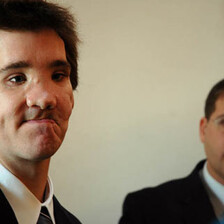The News and Observer 15 June 2003
Two months after machine-gun fire ripped through his face in Israel’s West Bank, peace activist Brian Avery of Chapel Hill returned home Saturday, his jaw wired shut and scars lining his face as he awaits more surgery.
A crowd of roughly 60 peace activists and friends burst into cheers as Avery, 25, rail-thin after weeks of being hooked to a feeding tube, rode down the escalator at Raleigh-Durham International Airport. He smiled despite the wires and rubber bands clamping his jaw, and his eyes sparkled at those in the crowd, many of whom held signs calling for peace and welcoming him home.
Cameras flashed and TV cameras rolled as his parents, Julie and Robert Avery, ran toward him. “Hi, sweetheart,” his mother said, clutching him. “Oh, it’s so good to have you home.”
On April 5, Avery, a nonviolent volunteer with the International Solidarity Movement, was in occupied Jenin, Palestine, when he went outside with a friend to see whether anyone needed help during an evening curfew. An Israeli military vehicle approached, and as he held his hands in the air, a machine gun fired at his face.
It was among three Israeli military incidents involving his group within a month. On March 16, Rachel Corrie, 23, of Charlotte was crushed to death trying to prevent a bulldozer from tearing down a home in Gaza. Thomas Hurndall, 21, of Britain was shot in the head April 11 as he helped children to safety; he remains unconscious.
Avery, a 1996 graduate of Chapel Hill High School, appeared stunned at the reception. “As long as there’s this many people ready to support peace and justice in the world, we’re in good hands,” Avery told the crowd through his clenched teeth. “I’m glad to be alive and that I’m going to keep meeting so many wonderful people.”
In Israel, Avery delivered food, accompanied injured people in ambulances and helped people cross checkpoints. Before that he spent a year at UNC-Greensboro, majoring in music. He has also pursued agriculture, organic farming, environmental interests and peace work in Europe, Chicago and New Mexico.
He recalled April 5 in vivid detail. “I fell, and one of [the activists] took off his shirt to stanch the wounds until the ambulance got there,” he said. “I knew … I was very critically injured. I was determined not to let it be the end of me.”
He was stabilized at a Jenin hospital then taken to another in Afula before a helicopter whisked him to Haifa, where he underwent three surgeries to rebuild the bridge of his nose and his eye sockets. He lost about 30 pounds and now faces operations to rebuild his jawbone, implant new teeth and restore his features through plastic surgery.
Through it all, he was upbeat. “When I first went to see him, I told him I took a picture of Elvis to give the surgeon,” said Robert Avery, a retired Navy captain, of reconstructing his son’s face. “He got a chuckle out of that.”
His mother is just thankful he’s alive. “The doctor said if [the gunshot] had been 1 inch different, we wouldn’t have Brian.”
Staff writer Aisling Swift can be reached at 956-2468 or aswift@newsobserver.com.

